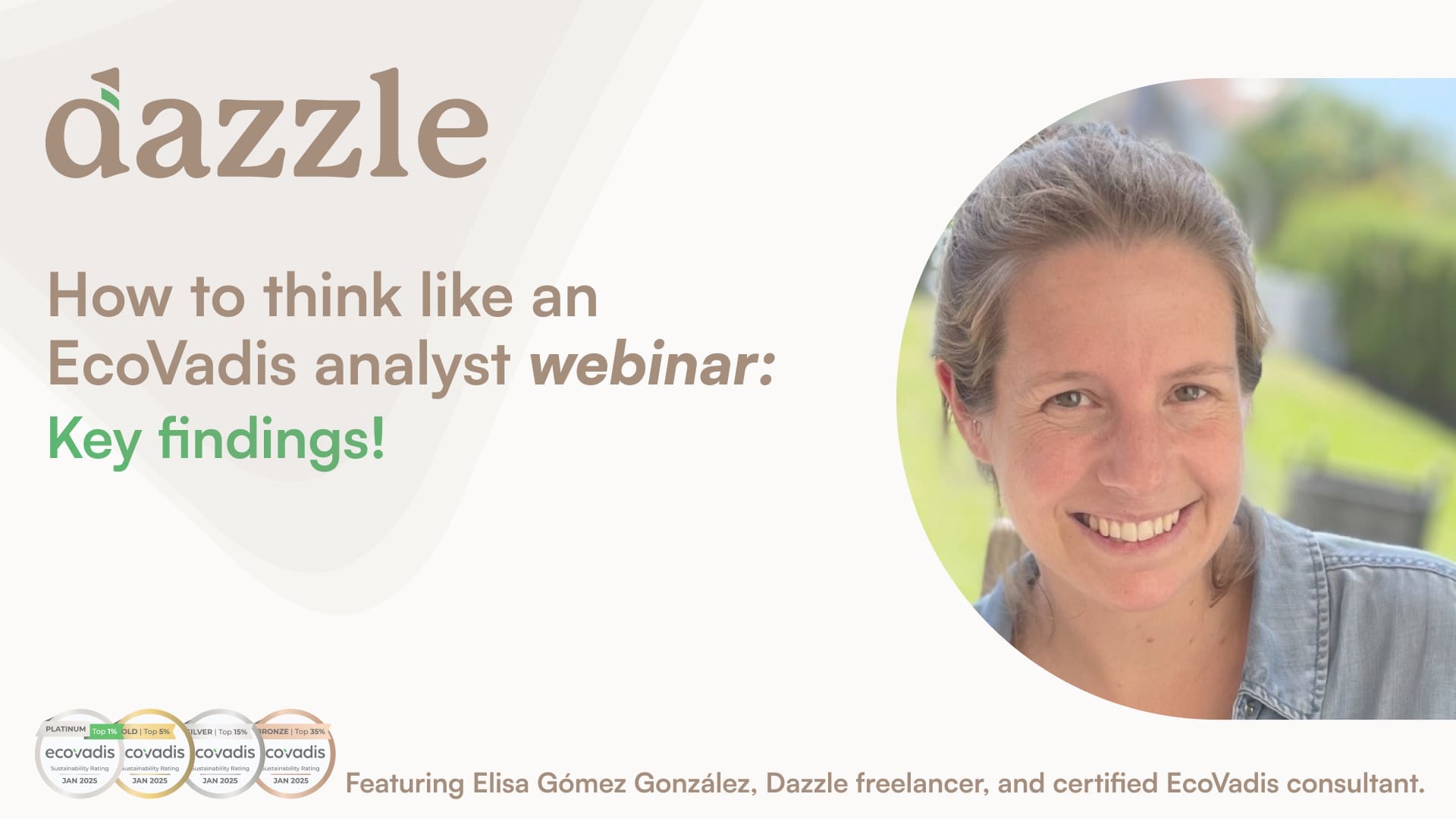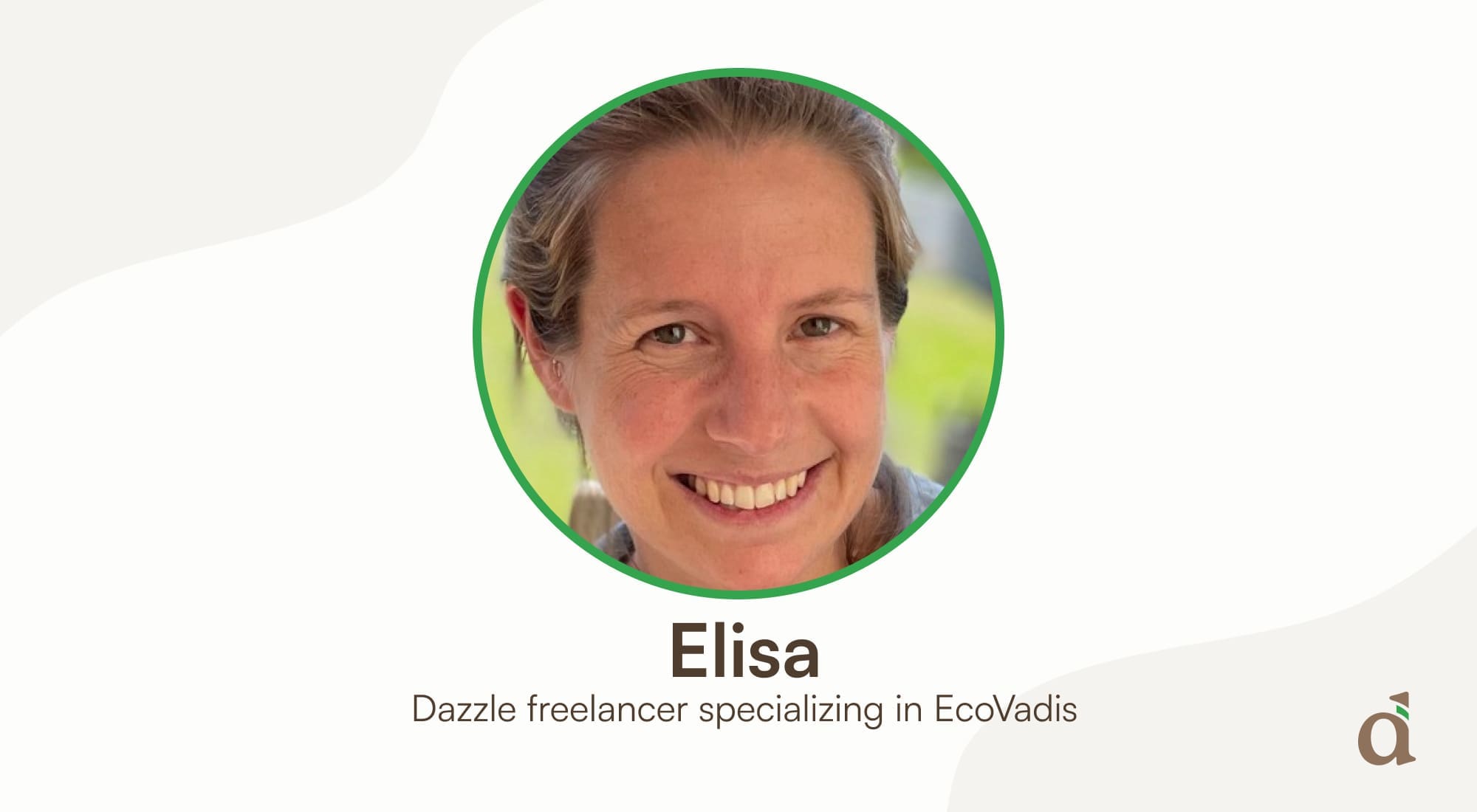Have you ever wondered how EcoVadis decides whether your company gets a Bronze medal or reaches that sweet, coveted Platinum?
If you happen to be preparing for an EcoVadis assessment right now, understanding this scoring method should probably be one of your main priorities. Because once you do, you can make sure to focus your efforts in all the right areas.
The good news is that even though the details can seem complex at first, their approach follows a clear structure. In this article, we’ll cover the main things you need to know.

What is EcoVadis and why does their scoring system matter?
First things first though, how about a little refresh regarding why your EcoVadis score is so important in the first place?
Well to begin with, EcoVadis is the world’s largest provider of business sustainability ratings. They work with over 100,000 companies around the globe, and their method has become widely regarded as the gold standard for measuring how well companies handle sustainability.
Many big organizations now actually require their suppliers to achieve specific EcoVadis ratings. Meaning that EcoVadis scores are increasingly becoming essential for accessing new markets and maintaining your existing business partnerships.
So it goes without saying that understanding how EcoVadis actually lands on your final score is crucial.

How does EcoVadis actually calculate your score?
The EcoVadis scoring system uses a questionnaire to assess companies across four main areas: Environment, Labor & Human Rights, Ethics, and Sustainable Procurement.
The Environment section looks at things like energy use, emissions, water usage, and waste management. Labor & Human Rights covers working conditions, employee rights, and safety practices. Ethics assesses your anti-corruption measures and fair business practices. And Sustainable Procurement examines how you manage supplier sustainability.
Each of these areas is weighted differently based on what risks your industry faces and what type of company you are. This means that every company receives a customized questionnaire based on its business sector, size, and location.
This weighting system ensures that each company is assessed on the sustainability challenges most relevant to their business. For example, manufacturing companies are often evaluated with greater emphasis on environmental criteria, while service companies are assessed more heavily on ethics and labor practices.
Each question in the EcoVadis questionnaire is scored based on your submitted documentation and evidence. Each score is weighted according to the question’s relevance to your company and industry, and the weighted scores are then added together to calculate an overall percentage score. This total determines your medal ranking: Bronze, Silver, Gold, or Platinum.
Overall, this system makes sure that your final score reflects both your company’s performance, and the sustainability challenges most material to your business.
But what about those different medal rankings though, what do they actually mean?

What do the different EcoVadis rating levels mean for your business?
The EcoVadis rating system uses medals to show how your sustainability performance compares to other companies in the same industry and of similar size. Bronze represents the top 50% of companies, Silver the top 25%, Gold the top 10%, and Platinum is for the top 1% of performers.
- Bronze Medal (45-54 points): shows you have solid basic sustainability practices with policies in place.
- Silver Medal (55-64 points): shows advanced management systems with regular monitoring.
- Gold Medal (65-74 points): reflects leadership-level performance with comprehensive programs and third-party certifications.
- Platinum Medal (75-100 points): represents exceptional excellence with innovative practices and industry-leading performance.
Crucially, these medal levels can directly affect business opportunities. Many multinational corporations now require minimum Silver or Gold ratings for supplier partnerships. While achieving Platinum status often leads to preferred supplier relationships and better contract opportunities.
You might be wondering now, why exactly is it that some companies within the same industry achieve a Platinum medal, and others a Bronze, or no medal at all?
And you are right to wonder that. As understanding why these differences happen can help you better prepare for your own assessment.

Why do EcoVadis scores vary so much between companies in the same industry?
Are you a Platinum, or are you a Bronze? The answer to this question can often be affected by the following factors:
- Company size and complexity: Companies with multiple locations, international operations, or extensive supply chains are assessed across a broader set of criteria. This creates more areas where performance can vary, leading to differences in scores.
- Operational practices and sustainability programs: The depth and maturity of a company’s sustainability initiatives directly influence its score. Organizations with well-established policies, robust environmental programs, and strong labor and ethics practices tend to achieve higher ratings than those with emerging or limited programs.
- Quality and completeness of supporting documentation: EcoVadis relies on evidence submitted by the company. Comprehensive, clearly documented policies and procedures demonstrate strong sustainability management and generally result in higher scores, while minimal or incomplete documentation can lower ratings.
- Regional and legal context: Local laws, reporting requirements, and sustainability priorities can affect how certain questions are evaluated. Even within the same industry, companies in different countries or regions may see differences in scoring due to these contextual factors.
Sounds so simple, doesn’t it? The truth is, this isn’t supposed to be a simple assessment. It is complex precisely because the score it attributes is so extensive and accurate.
But given the complexity involved, and the significant business impact of your EcoVadis rating, many companies find that expert guidance can make the difference between achieving their target score or missing crucial business opportunities.
And Dazzle has got just the expert guidance you need, when and how you need it.

Expert support for your EcoVadis journey
There is no doubt that understanding the complexities of EcoVadis scoring requires deep knowledge of sustainability frameworks, evidence requirements, and industry-specific details. To achieve the best results here, specialized expertise is a must.
And that is just what Dazzle can connect you with today, through our carefully vetted, on-demand network of sustainability experts. Whether you’re preparing for your first assessment or looking to improve an existing score, our EcoVadis experts can guide you through every part of the process.
Contact us today, and we can send you a shortlist of expert profiles within 48 hours.
That way, you can make sure you achieve the best EcoVadis score possible, and enjoy all the business opportunities that come with that.





